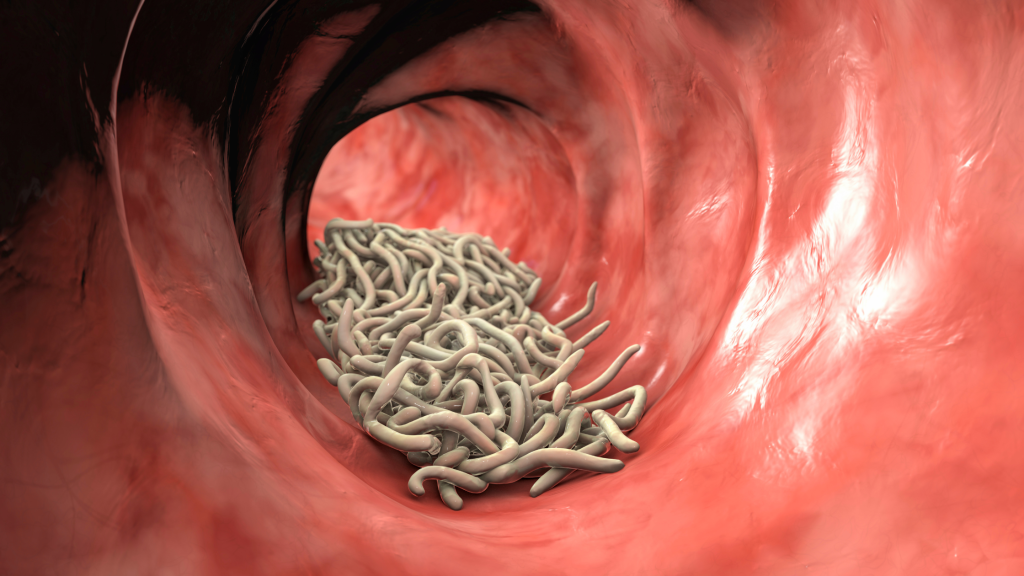Parasites in the digestive tract of dogs, such as dog worms or tapeworms, are a common problem faced by dog owners. These endoparasites, most commonly found in the intestines, can cause serious health problems in both young and adult dogs.
It is important to know how to recognize a dog worm infection, prevent infection, and ensure that your pet stays healthy.
Table of contents
Dog worms: types
There are several types of dog worms:
- Roundworms in dogs
- Flatworms (also known as tapeworms)
Roundworms are most common in young puppies, causing bloating, vomiting, and diarrhea.
Tapeworms are long and segmented, most often seen in feces or around the dog’s anus as white rice-like segments. Dog worms cause bleeding in the intestines and damage the intestinal wall.

Symptoms and diagnosis
Dog worms and signs of infection:
- Loss of appetite,
- Weight loss,
- Vomiting,
- Diarrhea,
- Lack of energy,
- Coat shedding.
If you notice these symptoms, you should see a vet, who will test the stool and give the right treatment.
Destruction of dog worms – deworming
Regular antiparasitic prophylaxis is the main way to protect your dog from dog worms. In addition, it is important to follow hygiene rules, such as removing dog excrement and regularly cleaning the dog’s bed.
If your dog shows signs of a dog worm infection, you should consult a veterinarian immediately.
Methods of deworming (dehelminthization) dogs
Antiparasitic drugs come in various forms: paste, oral suspension, drops, or tablets. Paste or suspension is usually recommended for small puppies, while tablets are recommended for adult dogs.
It is important to dose the medication accurately according to the dog’s weight and never exceed the prescribed dose.
By taking care of your dog’s health and following a regular deworming routine, you can protect your pet from dog worms and ensure the safety of your entire family.
All of the most effective dog worm treatments are prescription only and can only be purchased at veterinary clinics.
It is important to know that deworming treatments only affect the parasites themselves and are not harmful to your dog’s body.
However, if there are a large number of dog worms in the digestive tract, the parasites killed by the medication can cause intoxication, so it is recommended to follow your veterinarian’s instructions regarding the appropriate dosage and frequency of treatment.

When and how to deworm puppies for the first time?
Puppies can be dewormed (dehelminthized) from 1 month of age. Veterinarians at the Begemotas Veterinary Clinic recommend that puppies up to 6 months of age be dewormed every month.
This is especially important because roundworm larvae can enter the mammary glands and infect puppies through milk.
Deworming an adult dog
Deworming is necessary not only for puppies, but also for adult dogs. The frequency of deworming depends on lifestyle and risk of infection, but most veterinarians recommend deworming adult dogs every 3-6 months.
This helps to ensure that the dog remains healthy and protected from dangerous parasites. In addition, if you are planning to breed your dog, it is necessary to deworm her 2 weeks before mating.
De-worming your dog before vaccinations
Deworming your dog before vaccination is necessary for the vaccine to be effective. Parasites such as roundworms or tapeworms weaken your dog’s immune system, so the vaccine may not produce the desired immune response.
The best time to deworm is 10-14 days before the planned vaccination.
Are dog worms dangerous to humans?
Yes, some dog worms are dangerous to humans. Humans can become infected with dog worm eggs through contact with contaminated soil or dog feces.
Children are particularly vulnerable, as they may play outside and accidentally touch contaminated soil. To avoid infection, it is necessary to wash your hands frequently, avoid contact with dirty surfaces, regularly deworm your pets, and pick up your pet’s feces when walking outside.
By taking care of your dog’s health and following preventive measures, you can prevent the spread of dog worms and ensure the safety of your entire family.

Where to go for dog worms?
Want to ensure your pet’s health? Contact the specialists at Begemotas Veterinary Clinic and get detailed advice on dog fleas and how to prevent them.
Do you have questions about caring for your pet? Our veterinarians are ready to help and provide professional recommendations.
Sign up for a consultation at the Begemotas Veterinary Clinic today and make sure your dog stays healthy and happy!





